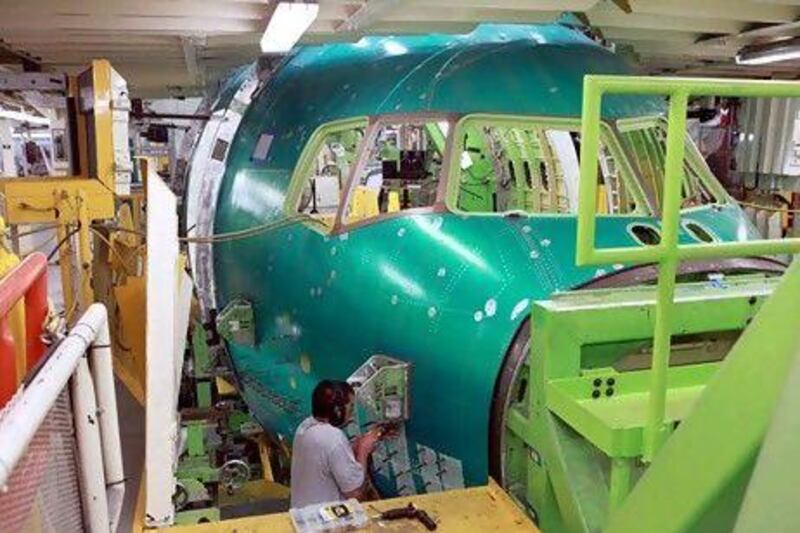The forecast is "dull" for the opening of the Farnborough International Airshow today - for both the weather, and for business.
The record orders delivered last year by the Paris Air Show, with which Farnborough alternates, is not expected to repeat itself this week in England.
But because few are likely to be buying, expect the plane makers to be selling harder - both from their military inventories and their airliner stables.
The civil market will be flat because either all the big carriers already have huge order books still to be fulfilled, or because falling profits, unfriendly government policies and rising fuel prices mean they cannot afford to go shopping this year.
Show organisers of the world's biggest and most prestigious aviation bazaar, which takes place about an hour's journey from London, expect only three quarters of the 1,400 exhibitors who attended in 2010 will be returning this year.
Many major aerospace companies have rented smaller stalls and others, including the United States military manufacturer Northrop Grumman, are staying away altogether.
However, the organisers say emerging countries such as Brazil, China, India and Russia are filling the empty stands, according to Shaun Ormrod, the chief executive of Farnborough International, the show's organiser.
Etihad Airways, Emirates Airline and Qatar Airways, the traditional big spenders, have order books that will double the size of their collective fleets by the end of the decade, and have indicated there will be no surprises from them. Etihad alone has some 205 aircraft on order, most for delivery before 2020.
According to International Air Transport Association figures the Middle East carriers are leading the resurgence in civil aviation's fortunes following the economic collapse in 2008. But what they need right now is for the aircraft on order to be delivered, not to order any more.
Asia-Pacific is also performing well, but there too there have already been big orders from the major growth contenders. AirAsia and IndiGo, two low-cost carriers competing in a sector and in geographic markets that will certainly experience unprecedented expansion over the coming years, already have new fleets on order.
Only Turkey and China look likely to deliver good news for Airbus and Boeing, the two aerospace giants. Turkish Airlines is expected to announce soon its choice of either the A380 superjumbo, or the latest version of the jumbo, the Boeing 747-8, for its next generation of long-haul jets.
And China's appetite for civil airliners has barely been tapped. Airbus already has a factory in Tianjinthat has turned out more than 50 A320 airliners in the past two years exclusively for Chinese carriers.
Yesterday Reuters reported industry insiders as describing the ongoing price war between the two as "hand-to-hand fighting".
Last year, both Airbus and Boeing announced their plans for revamped versions of their narrow body-jet programmes, the A320neo, and the Boeing 737 Max; there was a flurry of orders and airlines that acted quickly had a decent chance of securing early delivery slots. But with the narrow body aircraft backlog standing at more than 6,000 units and production rates at 70 to 75 a month, any airline ordering this week will wait five to six years for delivery.
However, ahead of Farnborough, the Australian budget carrier Virgin Australia ordered 23 B737 jets to replace its ageing 737-700 fleet. Airbus certainly agrees Boeing will top the order book this show.
"Boeing will definitely announce more aircraft than we do at Farnborough but I would only ask everybody … not to just look at this year's orders," said John Leahy, the Airbus chief commercial officer. "Look at the two years 2011 and 2012. We'll out-sell Boeing in total in those two years. We'll outsell Boeing in the neo versus the Max in those two years in which both have been offered to sell - and that will keep us in a very good position."
Airbus predicts 4,600 new single-aisle aircraft will be needed in the United States over the next 20 years, and to meet that market, last week announced it would build a $600 million (Dh2.2 billion) assembly plant there in Mobile, Alabama, to produce the A320. Industry forecasts predict airlines will buy 26,900 more passenger jets by 2030 as the global fleet doubles from 15,000 to more than 31,500. Whether Boeing or Airbus, or the new players in the market from Brazil, Canada and China will benefit from much of that demand turned into orders this year, is moot.
Defence looks to be in the same trough, with $500 billion being cut from the US defence budget and the European aerospace and defence industry also under significant pressure from shrinking budgets.
And although much of that reduction will be offset by rising demand in emerging countries in Asia and the Middle East, analysts the Teal Group, the aerospace consultants based in Fairfax, Virginia, predict that worldwide military spending is likely to be flat to slightly lower this year than last year, after more than a decade of continuous gains.
In Europe, Eurofighter and the Saab Gripen are exposed to budget reductions. For Dassault, the outlook for its Rafale fighter has improved since India said it was the preferred contender for its current strike aircraft requirement - although no contracts have been signed.
Meanwhile, Boeing will be pushing its V-22 Osprey, the tilt-rotor utility aircraft it describes as an alternative to the helicopter. Indeed, the UAE is interested. And Boeing's C-17 transport could steal a march on its Airbus rival the A400, which will not be putting in an appearance because of engine problems.
"We expect cautious commentary from defence companies at Farnborough, reflecting concerns about the outlook for western defence budget cuts," UBS bank analysts said in a note to clients.
twitter: Follow and share our breaking business news. Follow us
iPad users can follow our twitterfeed via Flipboard - just search for Ind_Insights on the app.





